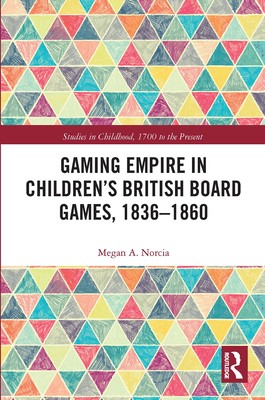
- We will send in 10–14 business days.
- Author: Megan a Norcia
- Publisher: Routledge
- ISBN-10: 0367731290
- ISBN-13: 9780367731298
- Format: 15.2 x 22.9 x 1.5 cm, softcover
- Language: English
- SAVE -10% with code: EXTRA
Gaming Empire in Children's British Board Games, 1836-1860 (e-book) (used book) | bookbook.eu
Reviews
Description
Over a century before Monopoly invited child players to bankrupt one another with merry ruthlessness, a lively and profitable board game industry thrived in Britain from the 1750s onward, thanks to publishers like John Wallis, John Betts, and William Spooner. As part of the new wave of materials catering to the developing mass market of child consumers, the games steadily acquainted future upper- and middle-class empire builders (even the royal family themselves) with the strategies of imperial rule: cultivating, trading, engaging in conflict, displaying, and competing. In their parlors, these players learned the techniques of successful colonial management by playing games such as Spooner's A Voyage of Discovery, or Betts' A Tour of the British Colonies and Foreign Possessions. These games shaped ideologies about nation, race, and imperial duty, challenging the portrait of Britons as absent-minded imperialists. Considered on a continuum with children's geography primers and adventure tales, these games offer a new way to historicize the Victorians, Britain, and Empire itself. The archival research conducted here illustrates the changing disciplinary landscape of children's literature/culture studies, as well as nineteenth-century imperial studies, by situating the games at the intersection of material and literary culture.
EXTRA 10 % discount with code: EXTRA
The promotion ends in 17d.23:46:04
The discount code is valid when purchasing from 10 €. Discounts do not stack.
- Author: Megan a Norcia
- Publisher: Routledge
- ISBN-10: 0367731290
- ISBN-13: 9780367731298
- Format: 15.2 x 22.9 x 1.5 cm, softcover
- Language: English English
Over a century before Monopoly invited child players to bankrupt one another with merry ruthlessness, a lively and profitable board game industry thrived in Britain from the 1750s onward, thanks to publishers like John Wallis, John Betts, and William Spooner. As part of the new wave of materials catering to the developing mass market of child consumers, the games steadily acquainted future upper- and middle-class empire builders (even the royal family themselves) with the strategies of imperial rule: cultivating, trading, engaging in conflict, displaying, and competing. In their parlors, these players learned the techniques of successful colonial management by playing games such as Spooner's A Voyage of Discovery, or Betts' A Tour of the British Colonies and Foreign Possessions. These games shaped ideologies about nation, race, and imperial duty, challenging the portrait of Britons as absent-minded imperialists. Considered on a continuum with children's geography primers and adventure tales, these games offer a new way to historicize the Victorians, Britain, and Empire itself. The archival research conducted here illustrates the changing disciplinary landscape of children's literature/culture studies, as well as nineteenth-century imperial studies, by situating the games at the intersection of material and literary culture.


Reviews